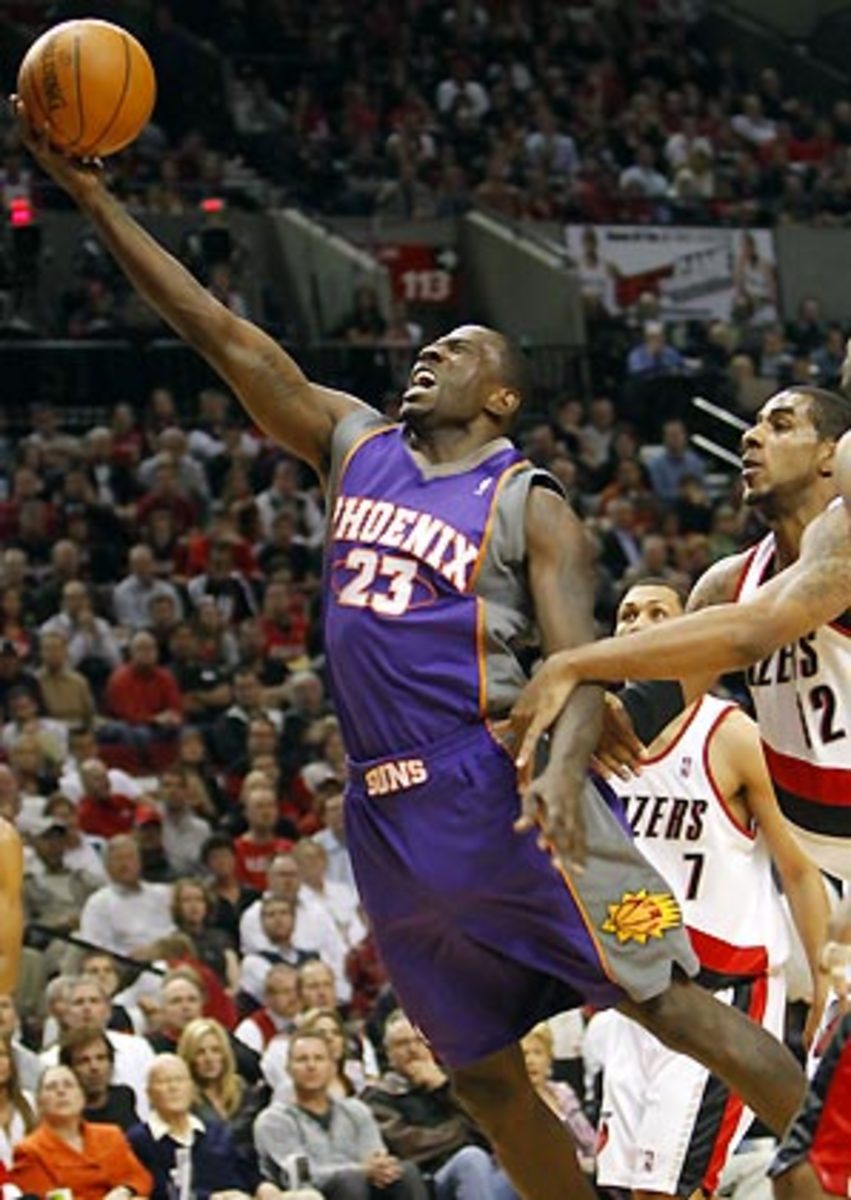Fast Breaks: Suns-Blazers, Game 6
• Brandon Roy started. As he said after a decisive loss in Game 5, Roy felt more comfortable starting than he did in a limited capacity off the bench. Coach Nate McMillan complied. It did not help Portland's cause. From the start, it was obvious that Roy was still limited, unable to get his jump shot off effectively over less-skilled players. Commendably, Roy played 37 minutes. However, he was just 4-of-16 from the field, 1-for-8 from behind the three-point arc and scored 14 points on 16 shots. In addition, on several occasions he hobbled up the court, pointing to a teammate to pick up his man, who invariably was Jason Richardson. J-Rich happened to go for 28 points.
• Richardson starts out hot, ends hot. Richardson hit two early threes, and at the same time point guard Steve Nash was turning over the ball a career-worst six times in the first quarter, Richardson was giving the Suns a comfortable lead by scoring 14 first-quarter points. When the Blazers made a fourth-quarter comeback, tying the game at 76-76 on a cavalcade of threes, it was Richardson's seven straight points that once again gave the Suns a cushion. On two of those buckets, Richardson was guarded by Rudy Fernandez, who twice in a row allowed Richardson to slip a screen and take a nice feed from Amar'e Stoudemire for a layup. Richardson finished with a game-high 28 points, which included five three-pointers, something he'll have to duplicate against San Antonio if the Suns plan to advance to the conference finals.
• Fernandez is a conundrum. The three-point shooting phenom offers a frustrating dilemma for McMillan. On the one hand, he is deadly from the outside. His record number of threes by a rookie last year was no fluke; the guy can flat-out shoot from long distance. He was 5-of-6 from three-point range and scored 16 points in 17 minutes on Thursday. When he was in the game, he spread the floor, which allowed LaMarcus Aldridge to operate inside. However, Fernandez is terrible defensively -- see Richardson's two consecutive baskets above -- and he makes low-quality decisions that often result in turnovers. But when he is on the bench, Andre Miller is in and defenses can collapse because Miller -- 2-for-10 for the game -- cannot consistently shoot from the outside. Does McMillan reward the guy for his offense or penalize him for his defense? He has all summer to figure it out.
• Stoudemire powers his way to production. Here's the thing about Stoudemire: He goes right EVERY time. Well, maybe not every time, but 99 percent. And yet, Portland's defenders failed to take away his drive to the right side when Stoudemire faces the basket. That either is a sign of poor scouting or that Stoudemire is so good that even though teams know what he is going to do, he still is able to convert. In this deciding game, Stoudemire had 22 points on 9-for-15 shooting, a stark contrast to Aldridge's 5-for-17, 16-point night.
• What will the Suns do against the Spurs? The lasting impression of a Suns-Spurs series is that of Nash being sent into the scorer's table by a hip check from Robert Horry, a sequence that redefined that 2007 series and ultimately led to San Antonio winning its fourth NBA championship during the Tim Duncan era. This San Antonio team does not really have the hard-nosed player like Horry or Bruce Bowen -- unless you consider Matt Bonner an enforcer -- so it will be interesting to see how Nash matches up with George Hill and Tony Parker or Stoudemire fares against Duncan -- who surely knows that Stoudemire likes to go right. If nothing else, the Suns deserved to advance; they were clearly a better team than Portland and came together at the right time.





